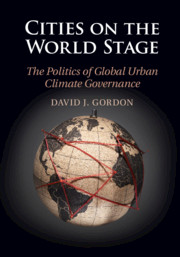Book contents
- Cities on the World Stage
- Cities on the World Stage
- Copyright page
- Contents
- Figures
- Tables
- Acknowledgments
- Abbreviations
- Introduction
- 1 The Contours of Coordination in the C40
- 2 A Theory of Global Urban Governance Fields
- 3 The Contours of Convergence in the C40
- 4 Act I
- 5 Act II
- 6 Act III
- Conclusion
- Book part
- References
- Index
3 - The Contours of Convergence in the C40
Published online by Cambridge University Press: 16 April 2020
- Cities on the World Stage
- Cities on the World Stage
- Copyright page
- Contents
- Figures
- Tables
- Acknowledgments
- Abbreviations
- Introduction
- 1 The Contours of Coordination in the C40
- 2 A Theory of Global Urban Governance Fields
- 3 The Contours of Convergence in the C40
- 4 Act I
- 5 Act II
- 6 Act III
- Conclusion
- Book part
- References
- Index
Summary
The theory of global urban governance fields asserts that coordination in city-networks rests on convergence around a common set of ideas and practices that shape how member cities understand themselves as global climate governors. This chapter applies cluster analysis to a dataset containing both 10,000-plus unique climate governance actions, as well as the climate governance profiles (type and content of emissions reduction target, scope and methodology of emissions inventory, focus and scope of climate action plan) of all C40 cities, to infer the governance norms and collective identity around which the C40 governance field has been organized. The analysis posits two core ideational components – what kind of agency do cities possess, and how do they orient themselves to the global effort – and identifies convergence over time and space around two distinct responses: governance norms of autonomous agency and global accountability. These norms, in concert with practices of standardization, transparency, accounting, and disclosure, constitute a collective identity: the globally accountable urban governor. The chapter provides empirical referents for this process of normative and identity convergence, and establishes the connection between these and observations of increased coordination and collective effort.
Keywords
- Type
- Chapter
- Information
- Cities on the World StageThe Politics of Global Urban Climate Governance, pp. 84 - 110Publisher: Cambridge University PressPrint publication year: 2020



